
Widgetized Section
Go to Admin » Appearance » Widgets » and move Gabfire Widget: Social into that MastheadOverlay zone
The Mystique Of Behavioral Interviewing
What you need to know to get the job
 What is Behavioral Interviewing?
What is Behavioral Interviewing?
This is an interviewing technique employers use to determine whether you are a good fit for the job. This is accomplished by asking questions that pertain to your past behavior. The information gained through this technique is used as an indicator of your future success. In other words, the answers you give about your past experiences will be used to predict your future performance – if you did it before you could do it again!
Is this a new technique?
No, it’s been around since the 70’s when industrial psychologists developed a way of “accurately” predicting whether a person would succeed in a job. They concluded if candidates were asked questions that requested examples of past behavior it would be an indicator of their future behavior.
What is the difference between a behavioral question and other questions?
A behavioral question will be very specific. For example when asked, “Tell me about a time when you solved a problem,” the key words are “a time.” This answer calls for a “specific” example of a “specific” incident.
When traditional or “what if” questions are asked you can use your imagination to come up with an answer. For example, “What would you do if you had a problem to solve?” “If,” is the clue word that the interviewer wants to hear your thought process – how you think through a problem. This question does not require a past experience example.
What preparation is necessary for behavioral interviews?
While preparation is important for every interview, it is essential to prepare for the behavioral interview. You must have examples or stories for anything you have claimed on your resume.
One example would be, if you claimed you were very organized on your resume, a natural question for the interviewer would be, “Tell me about a time when you organized a project.” It is now your task to let the interviewer know that you have had success when organizing a project or event.
The technique
There are several acronyms that work well for story telling or listening, but the main point you will want to remember is that any story has three key elements:
- A beginning – “There was a time….”
- A middle – “The action steps I took were…”
- An Ending – “The problem was solved and…”
What are there secrets of telling a good story?
Stories should be interesting and full of action. Give the interviewer something to remember about you. A savvy interviewer will be able to hear skills from the stories and judge your behavior from your past actions, but you must let them hear the steps you took to solve the problem. The more details and skills you can work into your story, the more convincing your story will be.
Preparing your stories before the interview will take the mystique out of behavioral interviewing and allow you to tell the success stories you want your interviewer to hear. Through your examples the interviewer will begin to get a clear picture of you and be able to decide whether you are the right person for the job.







You must be logged in to post a comment Login